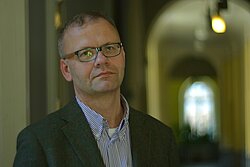Theology and Religious Studies
The doctoral study program “Theology and Religious Studies” offers its students to learn the necessary theoretical knowledge and practical skills to do independent research. Together with academic staff students can participate in research projects and giving lectures. The study program also offers the opportunity to take part in processes that are connected with research and its communication to wider society – international and national conferences, lectures of guest lecturers, seminars of dissertation themes and also science popularization events. In this study program, the important tendencies in theology and religious research are taken into account focusing its theoretical aspects on the globalized character of religious phenomena. Special attention during seminars is given to the methodology of research and the writing and publishing process of publications. Successfully graduating from this program, PhD candidates will be prepared for work in academic and other research institutions, as well as they will be able to work as high-level professionals outside of the academic environment. Within this study programme, there will be a common module with the doctoral programme of School of Theology and Religious Studies in Tartu University.
Study Programme Director

Professor Valdis Tēraudkalns
Doctoral students mostly work on researching their subject that results in a dissertation (at least 170 pages) in one of the European Union’s languages. Parallel that students participate in different courses in which they discuss the newest tendencies and methods in theology and religious studies and how to use this knowledge and skills within their research.
Within fields that are connected with religious research and the analytics of tendencies and processes that happen nowadays (Universities, institutions, media), administration (national and regional institutions, religious and non-profit organizations), praxis (churches and other religious organizations – within the fields of pastoral care, spiritual support and growth), and also with religious education and general service industry (for example, support for health workers, social and pastoral care).
Admission requirements*
Master's degree in any field.
*The study program has been submitted for regular accreditation, these admission rules are planned after new accreditation in May/June 2023:
Master's degree in the humanities, education, social sciences (sociology and anthropology) or equivalent higher education.
Students are admitted to the program after admission interviews and following centralized enrollment regulations (Doctoral study programmes (lu.lv)), according to the following priorities:
- Applicants who have a master's degree in the study field "Religion and Theology."
- Applicants who have master's degree in other social sciences, education or humanities study fields.
During the admission interviews, the applicants are rated on the sum of received points. During the discussions, it is determined whether applicants who do not have a master's degree corresponding to the study field have the necessary knowledge and experience to start doctoral studies in theology and religious studies. The results are used to determine which applicant will be able to study in the budget places.

 CONFERENCE
CONFERENCE